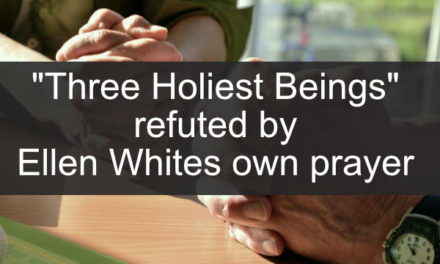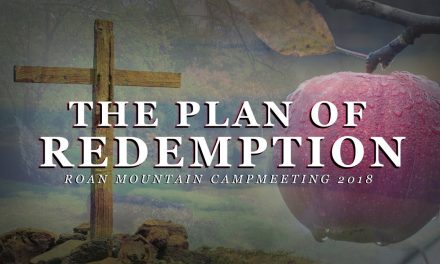THE PENALTY OF ADAM’S SIN
The sentence, “In the day that thou eatest there-of thou shalt surely die,” was the sentence suspended over Adam, to be inexorably executed upon him in case he should break the law of God, and eat of the forbidden tree. This sentence was not uttered upon conditions; it contained no proviso; there was no remedy in reserve whereby the threatened result could be avoided in case the penalty was incurred.
Adam sinned, and the blow fell. How long he had lived before he sinned, we know not. But up to this time no symptoms of feebleness or decay had shown their unwelcome presence. They now began immediately to appear; he became a mortal, dying man ; and at the end of nine hundred and thirty years, he yielded to the stern decree, ” Dust thou art, and unto dust shalt thou return,” and went back to mother earth, from whence he came.
This was the penalty ordained in Eden ; and Adam paid it. No plan of salvation could cancel it, or in any way enable man to avert it. And so death passed upon Adam, and in him, upon all men, inasmuch as they are the posterity of Adam, and he could beget them to no higher plane than that which he himself occupied after the fall — a mortal condition, a dying state, whose only end was death.
What kind of plan of’ salvation could, under these circumstances, be devised ? and what could it accomplish? This could be done: while the first arrangement, from its incipient condition to its ultimate stage, could not be interfered with, man could be given a new trial, until the sentence of the first transgression should reach its culmination — death. So, letting that arrangement, with its sin which could not be atoned for, and its penalty which could not be averted, stand apart by itself, to work out its own ends, Adam, during the remainder of his life, and all his posterity during their lives, were to have the privilege of securing through faith in Christ, the provided Redeemer, what Adam’s sin had rendered it impossible that they ever could obtain through the originally intended arrangement of unaided obedience. The object to be secured was the boon of everlasting life; but as the first penalty is not set aside, this cannot be enjoyed till after the law in reference to the first transgression has taken its course, and the penalty of death has been inflicted. It can be secured, therefore, only by a resurrection from the dead; and hence the plan of salvation, which is designed to place every individual of the human family on his own responsibility in reference to his future destiny, necessarily embraces in its provisions a release on the part of all from the death entailed upon us through Adam, in order that thenceforward each one may receive the things done in his own body, and live or die accordingly, as he himself has been a righteous man or a sinner.
It is only by overlooking this great principle, and taking a narrow and one-sided, instead of a broad and comprehensive, view of the whole scheme, that any have been led into the error of supposing that the wicked dead will never have a resurrection to life.
But after Adam’s first transgression and consequent fall, he doubtless sinned many times more before his death ; and we all sin “after the similitude of Adam’s transgression” and how is it that his subsequent sins could find pardon, and our sins can also find pardon, but his first sin could not be forgiven? Answer : Simply because there is now a Redeemer, and then there was none; now there is provision made for the forgiveness of sin, as then there was not. That is the difference between Adam’s condition after the fall and his condition before, and the difference between our condition and Adam’s before he fell.
We have been led to an expression of these thoughts by the inquiry of a correspondent, who says : “If Jesus Christ in his death paid the penalty for Adam’s sin, then for what did Adam die? Was, or was not, the penalty of death required of these two persons, for the one single offense?”
The reader who has followed the foregoing remarks will see that the question is already answered. Christ’s death had no reference whatever to Adam’s original sin, in the way of paying the penalty therefore, or saving men from its effects. There was no provision made for the forgiveness of Adam’s first sin ; and it never was forgiven. Adam paid its penalty by entering upon the downward road to death, and landing in the grave. And that satisfied the law, the wages of the transgression of which is death. And all men are accounted sinners in Adam so far as to come under the effects of this transgression, and become subject to death.
To this effect Paul testifies in Rom. 5 :12, ” Wherefore, as by one man [Adam] sin entered into the world, and death by sin ; and so death passed upon all men, for that all have sinned ;” or, as the margin reads, ” in whom all have sinned.” This certainly does not refer to the individual sins of any of the human race outside of Adam. Death has passed upon no man on account of his own sins, but only on account of that first sin of Adam’s. Adam was the federal head of the human family; and in him all are thus counted guilty, even the innocent babe, which falls in death the same as the wicked adult. Now inasmuch as this death has come upon all, unconditionally on their part, and irrespective of their characters, so Christ does a part of his work for all, unconditionally and irrespective of character ; that is, he releases all alike from this Adamic death : “As in Adam all die, even so in Christ shall all be made alive.” 1 Cor. 15 : 22. As all are accounted ” sinners “in Adam” so far as to become subject to death, so in Christ all are accounted “righteous” so far as to be released from death. Paul plainly states this fact in Rom. 5 :18, 19 : “Therefore, as by the offense of one [Adam], judgment came upon all men to condemnation [that is, “death passed upon all men”] ; even so by the righteousness of one [Christ], the free gift [irrespective of character] came upon all men unto justification of life [that is, they are considered so far justified by Christ, as to be released from this Adamic death]. For as by one man’s [Adam’s] disobedience, many [all] were made sinners [so far as to be subject to death], so by the obedience of one [Christ] shall many [the same number — all] be made righteous [so far as to be released from death].”
Thus by the plan of salvation the death which came as the penalty of Adam’s sin, which would otherwise have been eternal, is made only temporary. This could be so, without any retraction on God’s part; for there was nothing in the original sentence regarding the continuance of that death which Adam was to die if he disobeyed — nothing to make it necessarily eternal.
And when all are released from the Adamic death, and brought up to the plane of life again, each one then stands upon his own merits. Then death passes again upon the sinner; for “death ” is still “the wages of sin,” in our cases the same as in Adam’s. And when sinners fall in death this time, the death is eternal ; for no further plan of salvation supervenes to release them from it. And in the resurrection, the innocent child, and those who are found righteous through faith in Christ, enter into life of which there will be no end.
Thus the death of Christ has to do with Adam’s sins after the plan of salvation was laid, and with our sins, but not with that sin of Adam’s through which he fell, only to release all at last from its consequences, that they may all stand or fall for themselves.
More questions, we are aware, are alluded to in these lines than a strict adherence to the question of our correspondent would call for. But we felt that the question itself would be better comprehended, and the answer more clearly understood, if some of the collateral relations of this great theme were taken into account.
Uriah Smith, The Gospel Sickle, Sept 15 1888, pg 138









Recent Comments